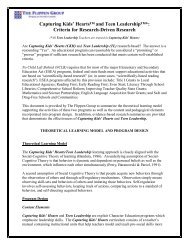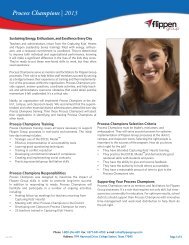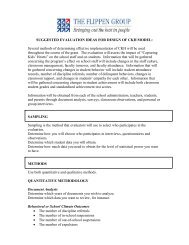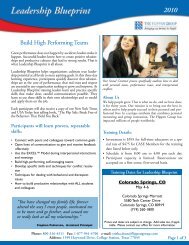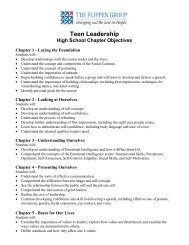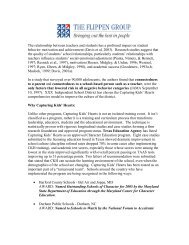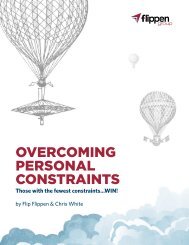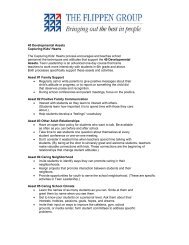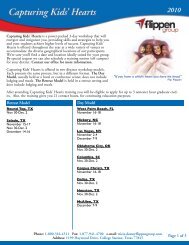Smart & Good High Schools - The Flippen Group
Smart & Good High Schools - The Flippen Group
Smart & Good High Schools - The Flippen Group
- No tags were found...
You also want an ePaper? Increase the reach of your titles
YUMPU automatically turns print PDFs into web optimized ePapers that Google loves.
CHAPTER 5: Fostering the 8 Strengths of Character—Outcome 3LTHE CHOICES WE GET TO MAKEife is a series of choices we get to make.We’re free to choose our values. We can let themedia tell us what’s important, or we can decide forourselves. We can base our standards on what othersare doing—or on what we know is right and good.We’re free to choose how to treat other people. Wecan put them down—or lift them up. We can be selfcenteredand inconsiderate, or we can be respectful,kind, and helpful.We’re free to choose how much we’ll learn. We canlook upon learning as an unpleasant duty or as agreat opportunity for bettering ourselves.We’re free to choose how we’ll handle adversity. Wecan allow ourselves to be crushed, to give up, and tofeel sorry for ourselves. Or we can look for a source ofstrength and deal with whatever life hands us.We’re free to choose our belief system and purpose inlife. We can wander through life aimlessly—or we cansearch for the ultimate meaning of life and then liveaccording to it.We’re free to choose our character. We can becomeless than we’re capable of—or all that we’re capable of.We’re free to choose our attitude, regardless of circumstances.This is the most important choice we’llever make because it affects everything else.—HAL URBAN, LIFE’S GREATEST LESSONS 21◆ Foster an attitude of gratitude. A positive attitude is difficultto sustain without a supporting virtue: gratitude. Inhis book, With Love and Prayers: A Headmaster Speaks to theNext Generation, Father Tony Jarvis, an Episcopal priestand head for 30 years of Boston’s all-boys Roxbury LatinSchool, shares the following talk about gratitude that hegave at a morning assembly:“If there is a secret of a happy life,it is living thankfully.”If there is a secret to happy living, it is living thankfully.Right now, sitting among you, are boys with alcoholic parents,boys from dysfunctional families, boys living in situationswhere they are physically and/or psychologicallyabused, boys living with parents who are dying painfully. Aboy whose mother was dying a hideous and painful death afew years ago said to me: “I’m grateful I can bring hersome small comfort by something I do or say each day.”No bitterness. No sense of entitlement to a trouble-free life.Life entitles you to nothing. If you want to be happy, youwill find happiness not from dwelling on all you do not havein life and feeling bitter about it. You will find happiness bydwelling on all that is good and true and beautiful in yourlife and being thankful for it. 22For thankfulness to become a virtue, however, it mustbecome a habit—developed, like all habits, through repetition.Acting on that insight, a high school Englishteacher has her students keep a daily Gratitude Journal:This semester I began having my classes do something Ihad been doing in my own life: keeping a Gratitude Journal.<strong>The</strong> first thing when they came into class each day, I askedthem to write in their Gratitude Journals five things theywere thankful for in the past 24 hours. It took just a fewminutes but made a real difference in their attitude and theclass climate.OUTCOME 3:Socially and Emotionally Skilled PersonPromising Practice 4:Teach manners.3“Manners”—once known as “commoncourtesy”—are an essential part of being asocially and emotionally skilled person. Manners areminor morals. <strong>The</strong>y are everyday ways we show considerationfor others. <strong>The</strong>y facilitate human interactions; in thewords of one writer, “Manners are the great social lubricant.”Manners are minor morals.When young people show good manners, they elicit apositive response from other people. <strong>The</strong>y are also moresecure, confident, and poised when they know how to actin social situations. And they will be more likely to teachmanners to their own children someday if they becomeparents.Some of the high school students we spoke with were verymuch aware of the importance of manners in school andin the workplace. <strong>The</strong>y also commented on the absenceof good manners they often see around them. A girl onour Student Leaders Panel identified “lack of manners” asa major character problem that schools should address:123<strong>Smart</strong> & <strong>Good</strong> <strong>High</strong> <strong>Schools</strong>




